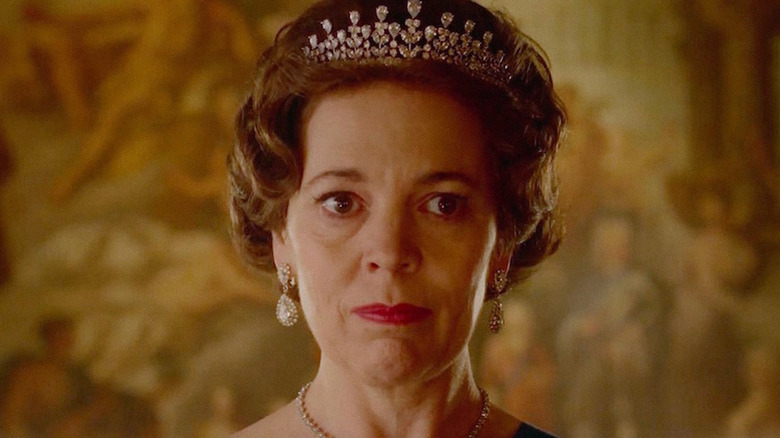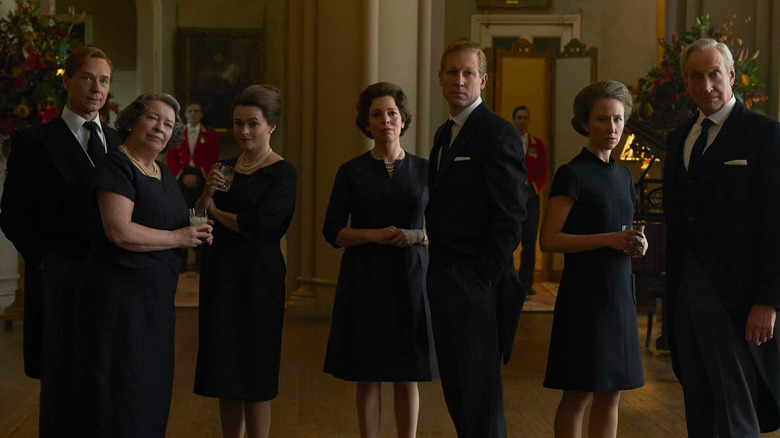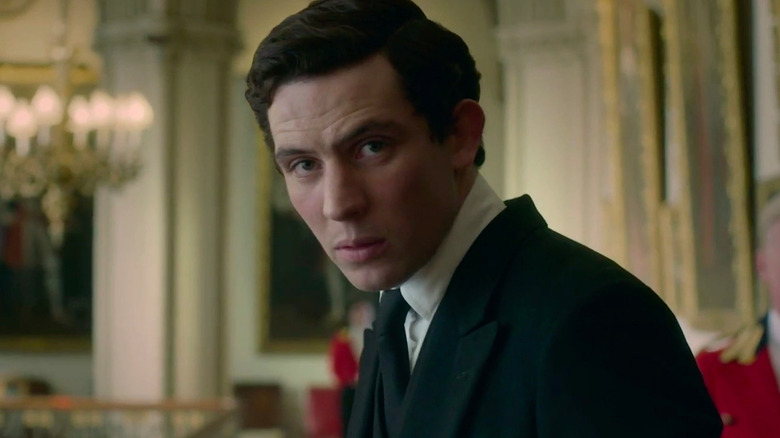Nothing About The Crown's Scripts Is Ever Set In Stone
It may seem like Hollywood is churning out more fictitious accounts of real-life figures than they ever have before, but the trend isn't exactly new. Films like "Spencer," "One Night in Miami" and of course, "Blonde," have cast a major light on this interesting subgenre, but prestige series like Netflix's "The Crown" have been in the business since 2016. And even before "The Crown," showrunner Peter Morgan was well known for adding context to the unexplored bits of British history — and telling those stories through the private lives of Britain's monarchs, politicians and public figures. From his big break as the screenwriter of "The Queen," the 2006 film that explored Queen Elizabeth's reaction to the death of Princess Diana, Morgan has reshaped the way that so many look at the British monarch.
There's a reason fans tune into "The Crown" with the same breathless fascination as they would an episode of "Real Housewives": the series has made the monarchy more relevant — and endlessly more interesting — than it had ever felt before to audiences outside of the U.K. And it does so with equally endless care. Each of Morgan's scripts is fastidiously researched and outlined before it's actually written, cobbled together by a team of researchers who form a makeshift writers' room. Still, that doesn't mean every element of "The Crown" is entirely historically accurate, nor is any plot point immune to its share of poetic license.
'He's not precious about the material'
Morgan outlined a bit of his process with The New York Times in 2019. Though the showrunner relies on his research team to collect information on certain historical events, Morgan will often tweak certain pieces of history to fit his narrative theme.
"He's not precious about the material," said Annie Sulzberger, who serves as head of research for "The Crown." Morgan and his team consult everything from eye-witness interviews to retrospective press clippings, and convene for weekly script meetings before a new season enters production. But not all of it makes the cut. "If something doesn't move the plot along, or reveal character, or tell us something relevant about Britain at the time, it doesn't have a place."
Even after the scripts are completed, Morgan is still making changes here and there. Olivia Colman, who played Queen Elizabeth in the third and fourth season of "The Crown," told the Times about the rehearsal process for the series:
"If something isn't working in rehearsal he'll say, 'Can you hang on a minute? Just talk amongst yourselves' ... Five minutes later it'll be, 'O.K., try that.' And sure enough he's just churned out a brilliant speech."
The underlying truth
Morgan is largely concerned with theme over narrative. "The Crown" is less a biography than it is a character study, one that spans generations. And he's not above fudging historical events to do so. The series is littered with historical inaccuracies — some minor, some major — and for that very reason, but Morgan counts on the "covenant of trust" he's fostered with the audience to keep things running smoothly. "Sometimes there are unavoidable accuracy blips," Morgan admitted. "An event might not have taken place where, or even when, I imagined it did. But I'm absolutely fastidious about there being an underlying truth."
"The Crown" fans might not know nearly as much about the Windsors as Morgan and his team do, but it's easy to feel as if the series really gets down to the essence of each figure it depicts. It's clear Morgan does what he does for a reason. Does it make Elizabeth's 70-year reign a bit more interesting? For sure, but each narrative choice still feels purposeful, even necessary, for telling the story right.


